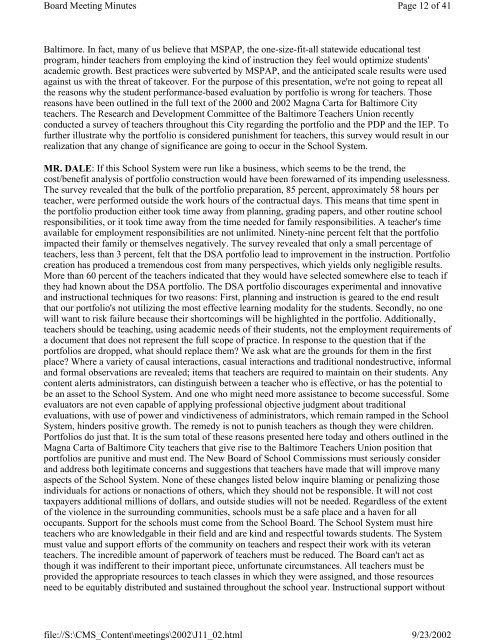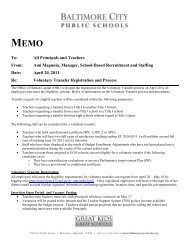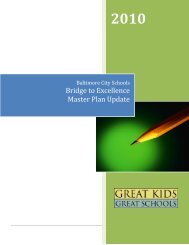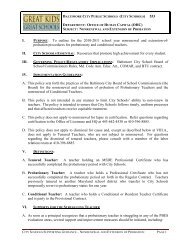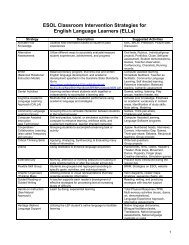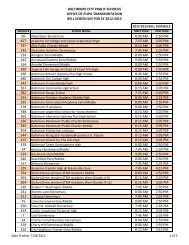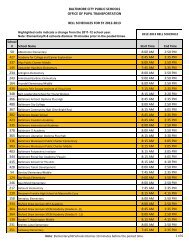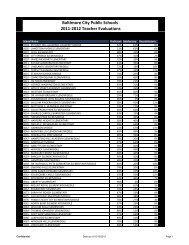June 11, 2002 - Baltimore City Public Schools
June 11, 2002 - Baltimore City Public Schools
June 11, 2002 - Baltimore City Public Schools
You also want an ePaper? Increase the reach of your titles
YUMPU automatically turns print PDFs into web optimized ePapers that Google loves.
Board Meeting Minutes<br />
Page 12 of 41<br />
<strong>Baltimore</strong>. In fact, many of us believe that MSPAP, the one-size-fit-all statewide educational test<br />
program, hinder teachers from employing the kind of instruction they feel would optimize students'<br />
academic growth. Best practices were subverted by MSPAP, and the anticipated scale results were used<br />
against us with the threat of takeover. For the purpose of this presentation, we're not going to repeat all<br />
the reasons why the student performance-based evaluation by portfolio is wrong for teachers. Those<br />
reasons have been outlined in the full text of the 2000 and <strong>2002</strong> Magna Carta for <strong>Baltimore</strong> <strong>City</strong><br />
teachers. The Research and Development Committee of the <strong>Baltimore</strong> Teachers Union recently<br />
conducted a survey of teachers throughout this <strong>City</strong> regarding the portfolio and the PDP and the IEP. To<br />
further illustrate why the portfolio is considered punishment for teachers, this survey would result in our<br />
realization that any change of significance are going to occur in the School System.<br />
MR. DALE: If this School System were run like a business, which seems to be the trend, the<br />
cost/benefit analysis of portfolio construction would have been forewarned of its impending uselessness.<br />
The survey revealed that the bulk of the portfolio preparation, 85 percent, approximately 58 hours per<br />
teacher, were performed outside the work hours of the contractual days. This means that time spent in<br />
the portfolio production either took time away from planning, grading papers, and other routine school<br />
responsibilities, or it took time away from the time needed for family responsibilities. A teacher's time<br />
available for employment responsibilities are not unlimited. Ninety-nine percent felt that the portfolio<br />
impacted their family or themselves negatively. The survey revealed that only a small percentage of<br />
teachers, less than 3 percent, felt that the DSA portfolio lead to improvement in the instruction. Portfolio<br />
creation has produced a tremendous cost from many perspectives, which yields only negligible results.<br />
More than 60 percent of the teachers indicated that they would have selected somewhere else to teach if<br />
they had known about the DSA portfolio. The DSA portfolio discourages experimental and innovative<br />
and instructional techniques for two reasons: First, planning and instruction is geared to the end result<br />
that our portfolio's not utilizing the most effective learning modality for the students. Secondly, no one<br />
will want to risk failure because their shortcomings will be highlighted in the portfolio. Additionally,<br />
teachers should be teaching, using academic needs of their students, not the employment requirements of<br />
a document that does not represent the full scope of practice. In response to the question that if the<br />
portfolios are dropped, what should replace them? We ask what are the grounds for them in the first<br />
place? Where a variety of causal interactions, casual interactions and traditional nondestructive, informal<br />
and formal observations are revealed; items that teachers are required to maintain on their students. Any<br />
content alerts administrators, can distinguish between a teacher who is effective, or has the potential to<br />
be an asset to the School System. And one who might need more assistance to become successful. Some<br />
evaluators are not even capable of applying professional objective judgment about traditional<br />
evaluations, with use of power and vindictiveness of administrators, which remain ramped in the School<br />
System, hinders positive growth. The remedy is not to punish teachers as though they were children.<br />
Portfolios do just that. It is the sum total of these reasons presented here today and others outlined in the<br />
Magna Carta of <strong>Baltimore</strong> <strong>City</strong> teachers that give rise to the <strong>Baltimore</strong> Teachers Union position that<br />
portfolios are punitive and must end. The New Board of School Commissions must seriously consider<br />
and address both legitimate concerns and suggestions that teachers have made that will improve many<br />
aspects of the School System. None of these changes listed below inquire blaming or penalizing those<br />
individuals for actions or nonactions of others, which they should not be responsible. It will not cost<br />
taxpayers additional millions of dollars, and outside studies will not be needed. Regardless of the extent<br />
of the violence in the surrounding communities, schools must be a safe place and a haven for all<br />
occupants. Support for the schools must come from the School Board. The School System must hire<br />
teachers who are knowledgable in their field and are kind and respectful towards students. The System<br />
must value and support efforts of the community on teachers and respect their work with its veteran<br />
teachers. The incredible amount of paperwork of teachers must be reduced. The Board can't act as<br />
though it was indifferent to their important piece, unfortunate circumstances. All teachers must be<br />
provided the appropriate resources to teach classes in which they were assigned, and those resources<br />
need to be equitably distributed and sustained throughout the school year. Instructional support without<br />
file://S:\CMS_Content\meetings\<strong>2002</strong>\J<strong>11</strong>_02.html<br />
9/23/<strong>2002</strong>


